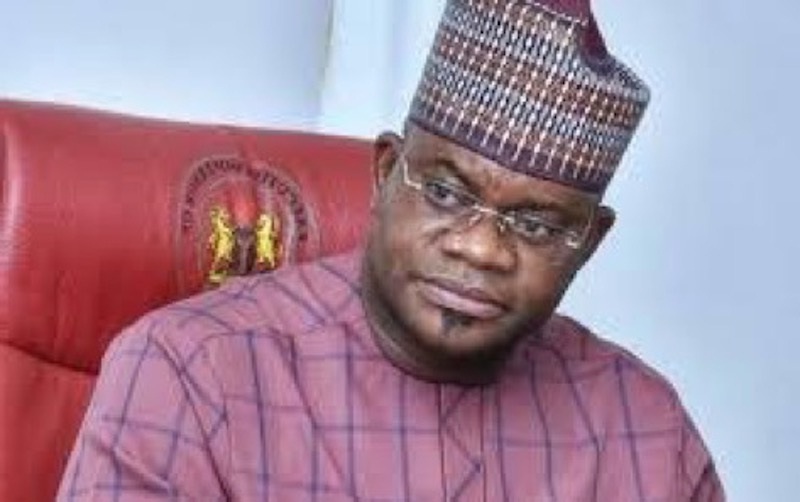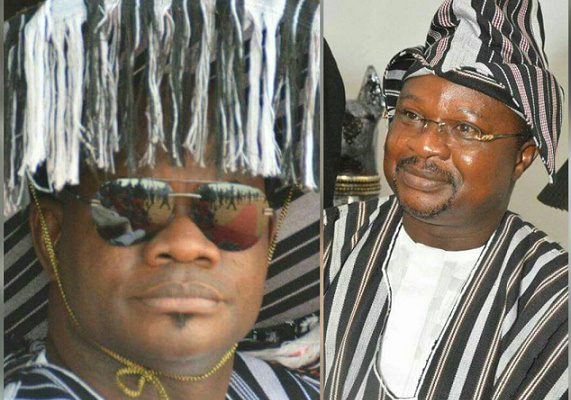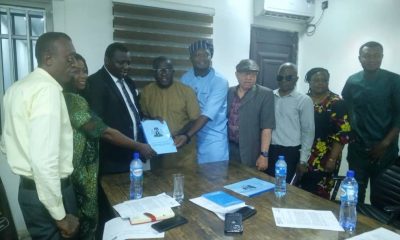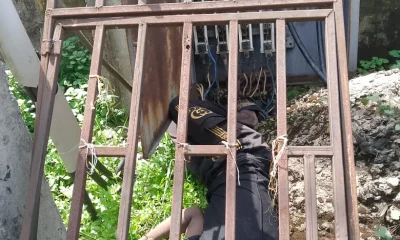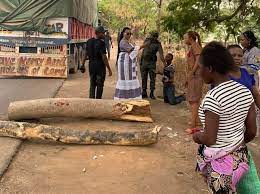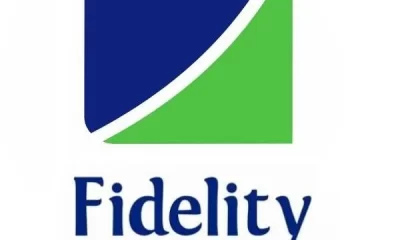OPINION
Letter To His Excellency, Gov.Yahaya Bello By Edward Onoja

Your Excellency Sir,
My Leader, Boss, Friend, Siamese Twin Brother; God-sent benefactor and Captain of the Ship of my Beloved Kogi State, the White Lion Himself, A year ago, whilst I was by your side working out the service of our State, the wicked ones of Kogi (those whose only desire is to hijack power by every means possible) pushed the lie they conjured in their dumb heads and maggot-infested soul that my wife, my three month old son and I were involved in a ghastly motor accident along Abuja-Lokoja Road.
To the glory of God, and the shame of devil, the desires of your enemies and our enemies did not come to pass, and we are all alive and healthy today.
God has also given more proof from our last Elections that your leadership of Kogi State is divinely made in heaven. I have no doubt that God will continue to protect us on this journey of the New Direction to the Next Level and no devil or his agents can stop us. God will always give us the overcomers’ grace. Thank you Sir for not yielding to the strong pressure to champion an Ethnic Agenda which excludes other tribes to the sole advantage ofAnebira. You have rather chosen to exemplify a United Kogi where all have the sense and feeling that they belong. Thank you for not towing the path of a religious extremist. We the followers of Christ appreciate you for the award of contract to build a befitting Chapel of Worship in Government House, making Kogi one of the few States which have a place of worship for adherents of both major faiths within the seat of power, just like the Presidential Villa.
Your heart is full of LOVE. May our Almighty God Whom you honour continue to honour you before your enemies, increase your greatness and comfort you on every side. Thank you for securing our state and ridding us of the violent kidnappers, robbers and thugs who held us hostage before your arrival in Government House. Thank you for rising up to the occasion and crushing the elements of
hell whenever they try to raise their ugly heads as they recently attempted in Omala. You are truly the most successful Governor of the entire 4th Republic in Security. Thank you for your herculean efforts to rapidly bridge infrastructural gaps left behind by many years of negligence by your predecessors.
Thank you for the many genuine reforms in the Civil Service which has changed the orientation and attitude of our people to work, even as you make spirited efforts alongside our Labour leaders and other stakeholders to access the balance of our bailout funds.
You have persevered in this task even as those who claim to love and fight for Kogi more than you are resisting your efforts and doing everything in their power to sabotage it in Abuja and elsewhere.
Because I know good will always triumph over evil, I know the painful obligation around salaries and wages will be put to rest shortly. When you triumph in this as you have done in every challenge, the enemies shall have no more song in their mouth but that of sectionalism and even that will perish in their mouth too.
Thank you for showing time and again that you truly love me. You may not recall this Sir, but I can truthfully say that the only time you have lost your temper with me since I started working for you was the night I went out without my full complement of security vehicles and details. You were so worried at the way I exposed myself that you remained angry and scolded me for 2 whole days. I have not and will not repeat that mistake. However, seeing you so concerned about me was completely reassuring. Thank you for being you to me, to us and to Kogi with all your powers.
If I am to choose my leader a million times, I will always choose you.
You are the MAN.
After you, na you!
Thank you for standing in for all of us your aides in good and bad times. Even to those who lost faith on this journey. Your rewards in life and eternity are bigger and more precious than
the loyalty of mere mortals. However, the Bible places a severe curse on betrayers:
*“Woe to that man by whom the Son of Man is betrayed! It would have been good for that man if he had not been born” (Matthew 26:24)!*
Let me therefore reiterate to you that I am Totally Loyal – to you to the CORE. I also declare that anyone (my self inclusive) who has soared to success with your support, or on your back, or by the incidences of your office, in fact, in any way at all who openly or secretly betrays you will harvest all the woes pronounces by the Bible.
Anyone who has enjoyed your largesse and has gone behind to stab you in the back will discover that each blow will pierce the heart of their own nearest and dearest until they wish they had never been born like the Bible says.
Thank you for your inspirational leadership which motivates us to go the extra mile on the job even when the going is tough and the results are not coming as fast as we expect.
Thank you for leading us ( The APC Family to an all time record Electoral Success. 25 members out of 25 in the Kogi State House of Assembly is the surest sign that your second tenure would is secure by
the grace of God and the will of our voters. It is also sign that the 3 Arms of Government will work speedily and with unity in moving us to the Next Level of the New Direction. Thank you for striving to unify Kogi State through proportional allocation of resources to all parts of the state.
Thank you for your great respect for our Traditional Institutions and their deliberate inclusion as Stakeholders and partners in the process of governance.
Thank you for keeping our eyes on the ball always through the example of your own personal habits of discipline and commitment.
Most importantly thank you for TRUSTING me, Edward Onoja, regardless of the noise of demonic liars who approach you with all sorts of diabolic falsehood in their bid to put a rope to the trust which binds us together so things can fall apart between us and in Lugard House.
Thank you for loving me and my family.
Thank you for loving our people, our state and our country.
I dare to prophesy that you will return again as Governor because your efforts are genuine and it aligns with God’s divine Agenda for Nigeria.
Already, after your stunning electoral victories in February and March, we are getting serious enquiries from the most unexpected people and quarters, your long time foes and detractors, seeking an
end to hostilities and asking how they can serve in advancing your cause in November and beyond.
This Project is a product of Prophecy. It cannot abort! It will arrive safely at DESTINATION.
My Boss, my friend and my Siamese Twin for Life!
I owe you LOVE!
And you have it unconditionally.
Eddie.
#Onoja is the Chief of Staff to Governor Yahaya Bello of Kogi State

OPINION
Ending the Menace of Oil Theft in Niger Delta

By Braeyi Ekiye
Standing up for justice and vocally too, is about standing up for each other. It is our duty to speak for the nation’s lingering ills to be corrected, particularly when others cannot speak up. That is the critical power of the voice for the reconstruction of the Nigerian State to attain the desired real nationhood.
Former governor and now a senator representing Bayelsa West, Seriake Dickson recently stood up to be counted on a serious national issue; oil theft and its debilitating consequences on Nigeria’s economy and security.
Answering questions on a programme at Channels Television recently, Dickson pointedly accused some very important personalities from Lagos and the Federal Capital Territory, Abuja for being behind oil theft in the Niger Delta.
Hear the Senator:” The Official system and oil companies are beneficiaries of oil theft in the Niger Delta”. Dickson bemoaned the absence of national values which he said, makes people to use the nation’s resources for selfish gains.
“People from Abuja and Lagos are the masterminds and the official system is not ignorant and not innocent. The official security system, the official oil system, the official federal system, all of it in its entirety. It’s a powerful system,” he stated.
Dickson wondered why a country like Nigeria that has been producing oil, exporting oil for the past 70 years was unable to have scientific way of metering, recording what leaves, what is pumped, what is sold and what is not sold? He concluded that it was a deliberate attempt at bleeding the country of her financial and economic wealth through illegal bunkering, superintended by local, national and international oil theft collaborators.
It is instructive that the Nigeria Extractive Industries Transparency Initiative (NEITI), had in November 6, 2023, through its Executive Secretary, Ogbonnaya Orji, said that oil theft was an emergency that posed serious threat to oil exploration and exploitation with huge negative consequences on economic growth, business projects and profit earnings by oil companies.
Orji stated that as a result of NEITI being a member of the “Special Investigative Panel on Oil Theft and Losses”, the organisation was aware that: “Oil theft is perpetrated mainly through pipeline clamping, illegal connections and major pipeline exploitation of abandoned oil well heads, pipeline breakages and vandalism of key national assets to illegally siphon crude into waiting vessels stationed in strategic terminals”.
NEITI maintained that it was a matter of fact that many members of the pipeline’s association were directly and indirectly involved in providing the skills and knowledge required to carry out oil theft.
Orji therefore, condemned the association for failing to put in place stringent regulations and appropriate sanctions to check involvement of their members.
While being hopeful that President Bola Tinubu’s leadership would spring a surprise to douse the fears, the apprehensions of critical Nigerian minds, like Senator Dickson, Ogbonnaya and many others, there is the compelling need for this administration to seriously interrogate this malignant ulcer on the nation’s oil industry. There is also the need to critically examine NEITI’s unsolicited solutions to the problems of oil theft that have held Nigeria’s economy prostrate and her developmental framework for accelerated growth in all facets stunted.
NEITI in a report titled: “Nigeria’s Battle With Crude Oil Theft: A Total of 4,145 Cases Since May 2023,” published by Arise News on November 23, 2023, revealed a staggering number of highlights of the severity of the issue at hand.
Also, in its weekly: “Energy & You” series aired on the NTA News Network, the NNPCL noted in Episode 7 that 344 crude oil theft incidents were recorded between January and April 2023. Meanwhile, by Episode 8 of the weekly NTA television series, NNPCL shared reports of crude oil theft incidents. A summation of crude oil theft incidents recorded between episode 8 (May 2023) and episode 30 (October 2023), revealed that a total of 4,145 crude oil theft incidents were recorded between May 2023 and the second week of October 2023.
According to NNPCL records, some of the more active hotspots for crude oil theft in the Niger Delta include; Ohaji-Egbema, Oguta (Imo), Ogbia, Imiringi (Bayelsa), Obodo-Omadino, Ughelli (Delta), and Egorobiri creek, Gokana, Iba community, Emuoha, Rumuji, Degema (Rivers).
Nuhu Ribadu, the National Security Adviser, had revealed in August 2023, that: “the country was losing 400,000 barrels of oil per day to crude oil thieves”. This led to commentators insisting that the persistence of crude oil theft in Nigeria lays bare the deep-rooted issues of corruption and severity of vulnerabilities in the country.
That, Nigeria lost more than ₦4.3 trillion naira to oil theft in five years, stolen in 7,143 pipeline vandalism cases is not news. NEITI had revealed this startling loss at the Nigeria Interventional Security Conference in Abuja, with the theme: “Bolstering Regulations, Technology and Security for Growth”, way back in November 2023. The conference was organised by the Pipeline Professionals Association of Nigeria. In a presentation at the conference, NEITI, the federal government agency, revealed that oil theft and losses in Nigeria have become a national emergency, and shall I say, a monumental embarrassment to the country.
Recently, Senator Munir Nwoko, representing Aniocha/Oshimili Senatorial Constituency shed more light on this disturbing matter. Nwoko said that certain security officials whose primary duty is to safeguard oil and gas assets, are actually complicit in this illegal trade. “They are driven by the financial gains associated with illegal activities”, the distinguished senator said.
The crude oil theft network encompasses a broad spectrum of individuals and groups as Senator Dickson rightly pointed out at the Channels TV interview and corroborated by NEITI. It involves foreign oil traders, shippers, bankers, refiners, top-ranking politicians and even military officials.
Providing data from the agency’s reports to back his claims, NEITI’s Orji, said: “NEITI in the last five years, 2017-2021, has found that Nigeria recorded 7,143 cases of pipeline breakages and deliberate pipeline vandalism resulting in crude theft and product losses of 208.639 million barrels valued at $12.74m or N4.325 trillion. NEITI reports also disclosed that during the same period, Nigeria spent ₦471.493 billion to either through repairs or maintenance of pipelines.
The criminal exploits, NEITI said, takes place, ‘most times in atmosphere of communities’ complicity and conspiracy of silence. This, therefore, calls for the Tinubu administration to swiftly swing into action to put an end to this dastardly act, or at least, reduce it to the barest minimum. After all, the state security agencies for effecting a quick resolution of this matter are at the president’s beck and call.
It would also be recalled that NEITI released empirical data of oil theft and losses way back 2009 and 2020 to the staggering figure of 619.7 million barrels of crude, valued at $46.16 billion or ₦16.25 trillion. In addition, Nigeria lost 4.2 billion litres of petroleum products from refineries, valued at $1.84 billion at the rate of 140, 000 barrels per day, from 2009 to 2018. Thus, the total value of crude losses between 2009 and 2020 is higher than the size of the country’s reserves and almost 10 times Nigeria’s oil savings in Excess Crude Account, NEITI said.
So, how long shall Nigeria continue to condone these criminal activities? The country’s inability to proffer answers to these questions will continue to keep Nigeria in a state of coma in her overall developmental strides, including her peace, unity and security.
Ekiye writes from Yenagoa, Bayelsa State.
OPINION
NIN-SIM Linkage and the Nigeria We Desire
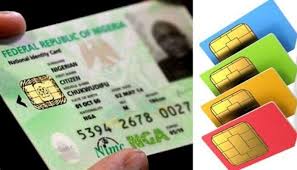
By Tunde Akanni
Rights and responsibilities are the twin words that best describe the inception and the increasing impact of digital technology, a major strand of which is the dynamic contemporary telecommunication services. Even before the imminent(?) internet of things (IOT), a lot is playing out for human civilisational process throwing up existential challenges for citizens and duly requiring governmental interventions to cope with.
If only to safeguard innocent citizens from the antics of criminals, government is often quick at fashioning laws and penalties for violations.
The most far reaching legal intervention in this context is the Cybercrimes Prohibitions Act of 2015 with its most significant component being the Cybercrime Advisory Council. Incidentally, this Council is considered rather exclusionary by media and allied rights advocates.The said deficit of the Cybercrime Advisory Council is a pointer to the fact that in climes such as ours, not much attention is often given by government to social needs, specifically in this case, Media and Information Literacy, MIL, already over hyped by the informed stakeholders. Unfortunately, some undiscerning members of the society keep falling falling victim of related laws.
Please follow this pathetic story, the audio of which I keep till date: Muhammad is a private school principal at Nyanya, an Abuja, suburb. As a side hustle, he runs a Point of Service (POS) business for payment. Then came a criminal one day who had just robbed and killed his victim. Using his victim’s card, he requested two transfers of N500,000 each.
The criminal made several other purchases and also went to some other operators of POS. Eventually he was found out and law enforcers had to track all transactions he had carried out with the victim’s card. Muhammad of Nyanya thus became a suspect and was promptly arrested. Thus began endless investigations… Muhammed ended up being detained for months in a prison.
You can imagine the psychological torture not only for Muhammad but his immediate family, employers and others who love him. He learnt his lesson in the bitterest way yet his ordeals could have been averted by sufficient exposure to basics of MIL. But life goes on. Indeed, it must be business as usual
Otherwise how do we explain the cacophony playing out after the expiration of the deadline of 29 March for NIN-SIM linkage? The Nigerian Communications Commission (NCC) has confirmed that it would not be reviewing its deadline to bar owners of more than four SIM cards whose SIM registration data failed to match their National Identity Number (NIN) data.
The Commission explained that its position was hinged on its objective to clean the country’s SIM ownership database, and ensure that criminals could not take advantage of having multiple unlinked SIMs to carry out their nefarious activities. The Commission’s resolve is hinged on the need to close in on the chaos of untoward ownership of multiple SIM cards with unverified NIN details. According to the Commission “we have instances where a single individual has over 10,000 lines linked to his NIN. In some cases, we have seen a single person with 1,000 lines, some 3,000 plus lines. What are they doing with these lines?
The NCC has also provided Mobile Network Operators (MNOs) an extension till 31 July within which they are expected to verify all NINs submitted by subscribers with four or less SIMs, as well as bar those whose NIN fail verification with NIMC.
The Chairman of Association of Licensed Telecommunication Operators, Gbenga Adebayo, further confirmed that members of his association would comply.
However, just the next day or so after the deadline expired, yours sincerely sighted no fewer than three reports announcing the extension of the deadline, one of them stating specifically to 31 July, referring to some reliable inside source.
What’s all the fuss about really? This NIN-SIM linkage is a simple exercise that only requires a subscriber to submit his or her NIN to the service provider to enable the service provider match details of the subscriber taken at the time of initial SIM registration process. This could be done through assorted windows including physically by visiting designated points. For techno-literate persons, they are merely expected to use short, universal codes for both submission and retrieval for those who may want to verify their own compliance as the media kept repeating deadlines.
The reality today is that barely literate persons and even illiterates now use telephones given its increasing centrality to a lot of human activities. This is the basis of this writer’s advocacy for an earlier generalist nomenclatural label suggestion of “Digital Culture” in place of “Digital Economy” preferred by Minister Ali Pantami when he chose to rename the ministry he was asked to superintend over (https://www.thecable.ng/digital-culture-or-digital-economy)
Telecommunication industry players have been unequivocal about the key benefit of NIN-SIM linkage being the protection of subscribers and prevention of crimes such as exemplified above. For instance, on account of the huge amount involved, the POS operators may have documented details of whatever identity provided by the criminal. As a matter of fact, the truth may have been readily revealed in the course of such documentation. But the information literacy knowledge could only have been deployed based on certain pre-existing conditions such as NIN-SIM linkage offers an example.
Still on crime, another major advantage that may derive from the NIN-SIM linkage is the ease with which law enforcers may trace and tackle criminals through their registered lines. Afterall, no one may be allowed to own any line except you are ready to play by the set rules.
Furthermore, this linkage thing will automatically ease economic transactions electronically since identities will be easily verifiable for concerned parties such as it pans out with regards to debit cards and similar devices. NIN-SIM linkage is therefore the way to go and the exercise has to run with a good measure of discipline especially with existing spectacular anomalies of thousands SIMs connected to some individual.
At this stage, the campaigns executed so far need be audited to make for genuine inclusivity with regards to social, geographical and other possible lines. For instance, this task now requires a well designed stakeholder mapping. The mapping must ultimately reveal spots of irregularities and areas as well as interests deserving more attention.
Given that all media genres had been previously deployed perhaps for conventional announcements, how about aligning subsequent dissemination more enriched via regular media contents? How about being more scientific, relativizing media use depending on audience preference and possible perception? In reality this could translate to devolving dissemination more to the grassroots by enlisting the emerging broadcasters namely, community broadcasters and campus broadcasters.
Beyond liberalising the media to be used, campaigns must also be made to align with credible programmes with obvious trendy touch of management such as may ensure their global reach and enduring availability as may be made possible by platforms like Youtube and Spotify.
With affiliation to champions of multi-stakeholder philosophy like the UN’s annual Internet Governance Forum, IGF, for the management of telecommunication facilities, need NCC be reminded of the importance of democratised governance culture?
It is most certain that the involvement of the relatively cheaper (not necessarily technologically inferior) community and campus broadcasters will help to boost the NIN-SIM linkage campaigns and indeed others that may arise in future.
It will as not be out of place for NCC to support the campaigns for the popularization of Media and Information Literacy. This certainly will help to resolve a lot of digital divide inspired issues
With the concern demonstrated on this exercise so far, NCC has demonstrated that it now has an improved corporate governance culture as advocated by IGF (https://punchng.com/nigerias-communication-governance-indifference/ ). It can however do better and even excel.
Akanni is an associate professor of media and development at the Lagos State University. Follow him on X via @AkintundeAkanni
OPINION
The Lessons of Okuama Tragedy

By Michael Owhoko
Has Nigeria learnt any lessons from the Okuama massacre? Will the incident repeat itself or offer profound lessons against a future experience? In the journey of life, no individual or nation or country is immune from occurrences thrown up by circumstance, which may be pleasant or painful.
Lessons from such experiences are deployed to prevent possible future reoccurrence, failing which the same catastrophe would repeat itself.In context, the gruesome murder of army officers at Okuama in Ughelli South Local Government Area of Delta State, which transcends ethnic emotions and was accompanied by wide condemnations, is a confirmation that Nigeria has not, and does not learn from lessons, otherwise the calamity would have been avoided.
The incident was not the first of its type. It had happened previously at Odi, Bayelsa State; Zaki Biam, Benue State; and Gbaramatu, Delta State, yet it appeared that neither the Federal Government nor the Nigerian Army learnt any lessons from the earlier occurrences. This is evident from the Okuama saga, a proof of the country’s insensitivity to bloodshed and exposition of poverty in the policy making process.
This notwithstanding, the Okuama calamity has again thrown up another opportunity for lessons to be learnt. If Nigeria fails again, this time around, to learn from these happenings, then the country risks further carnage, which may possibly take a more complex form, with unmanageable and unpredictable consequences. It may be too costly for the country’s fledgling socio-economic balance and stability.
Therefore, the lessons are crucial and should be identified by government, to be harnessed as feedback for proactive purposes, to forestall future recurrence. It is a tragedy for any country with a relapsing experience, not to have a codified strategy encapsulated in a template to resolve related matters. In specific terms, what then are the lessons and takeaways from the Okuama disaster?
Lesson One: To have allowed a land dispute over fishing rights between Okuama and neighbouring Okoloba communities in Bomadi Local Government Area, Delta State, to escalate means there were no proactive measures and prompt concerted interventions by the Nigeria Police Force and Delta State Government, in response to petitions written by the Okuama community.
The community, through its lawyers, I. Ejedegba and Co., had written a petition to the Commissioner of Police in Asaba, Delta State, which was acknowledged on 31 January, while that written by the community’s leaders to the Delta State Governor was received on 2 February. This was over one month before the gruesome murder of the military officers on 14 March.
Since the Police is the first line of contact and statutorily responsible for civil security matters, they should have waded in upon receipt of the petition, to nip the crisis in the bud, aside the previous joint meetings held among the communities, the Police and the Delta State Government that yielded no solution. Under this development, the Delta State Governor should have been advised to wield the big stick by acquiring the land in contention for public interest, to end the crisis.
Lesson Two: Inviting the Army for a mediatory and peace mission to Okuama for the resolution of a land dispute between two communities that were not at war, was an error in judgement. The dispute was civil in nature, and it was only when the efforts by the Police and the Delta State Governor had failed, and there was evidence of likely escalation into a dangerous dimension beyond the capacity of the Police, that would have warranted the intervention of the Nigerian Army. It is not the responsibility of the Army to broker peace in a civil matter.
Lesson Three: Central to the killing of the military personnel in Okuama is presumably oil. Oil appeared to be the underpinning motive behind the horrendous and senseless killings. Mere land dispute between two communities could not have led to such a mindless massacre. Soldiers are deployed to the Niger Delta region to protect oil facilities, and in the course of this duty, they might have been marked as “enemy” by those profiteering from illegal oil deals.
Those involved in crude oil theft and other illegal activities, including the processing of locally refined products, might see the Army as an obstacle to their business interests. The military high command should have known this, and prepared the soldiers for any possible eventuality and collision with entrenched oil thieves.
The circumstances of their deaths showed that the military men were taken unawares. It was likely that crude oil thieves and other vested interests might have planned and taken advantage of the soldiers’ peaceful disposition to unleash mayhem on them in such a horrific and despicable manner.
Lesson Four: The mass destruction of Okuama by the Army in response to the death of the soldiers, without singling out the culprits, was unhelpful, as innocent children, mothers, the elderly, the sick and even pregnant women, were either killed, rendered homeless or died while trying to escape.
To bring pain on an entire community over the action of a few criminals, is indefensible. Reprisal attacks and collective punishments are incompatible with international law.
It should be recalled that after the destruction of Odi by the Army, the community resorted to litigation and got a favourable judgement, leading to the payment of a N15 billion out-of-court settlement as compensation. Justice Lambi Akanbi of the Federal High Court had condemned the government for a “brazen violation of the fundamental human rights of the victims to movement, life and to own property and live peacefully in their ancestral home.”
Since the Okuama experience is reminiscent of the destruction in Odi, it is likely Okuama may seek redress in the law court for compensation over the reprisal destruction of lives and properties.
Lesson Five: As the President and Commander-in-Chief of the Armed Forces of Nigeria, Bola Tinubu’s order to the Army was too hasty and reactionary, without taking into consideration innocent lives in Okuama that were caught up in the web. Granting “full authority” to the military to bring anybody found to have been responsible for the attack to justice was an obvious blanket licence for the military to invade Okuama.
Instead, the President should have ordered the security agencies and the Police to specifically intervene, identify and arrest the criminal elements in the community, while instituting an independent high-powered panel of enquiry to unravel the causes of the mayhem. A future restraint on the part of the President is imperative to douse tension and minimise further collateral damage.
Lesson Six: The Army’s decision to lock down and lay siege to Okuama without granting access to the Delta State Governor, the Police, humanitarian agencies, and even the press to assess the situation on ground, has given rise to speculations about the plight of the members of the community, particularly the innocent, helpless and indigent persons. This is unhelpful to the image of the Army.
By not allowing access, the Army has unwittingly opened its operations to speculations. For example, it was alleged that the Army killed over 5O persons in Okuama, with other survivors hiding in the bush, including old women, children, the elderly ones and even the sick, with no food to eat or water to drink. This is a gross violation of their fundamental human rights.
To avoid being put on the spotlight, it is imperative for the military to grant access into the community to enable humanitarian agencies and volunteer groups extend help and assistance to the innocent ones, to prevent further fatalities. This will also serve the interest of the Army’s reputation.
Lesson Seven: After the destruction of Odi, initial public sympathy for the military waned. The same is replicating itself in Okuama over the conduct of the Army. The Army, like other Federal Government agencies, is not a supreme institution that is above the Constitution and the Nigerian State, neither is civilian population subject to military laws.
Indeed, the Army is subject to civil authority under a democracy. Therefore, it must change its current tactics at Okuama, where it has refused access to the community, assumed being the sole information provider on goings-on, and subjected civilians to investigation, arrest and detention.
It is hoped that these lessons will serve as reference and guide for the state governments, the Police, the Army and the federal government in the handling of related crises to avert future disasters.
Owhoko, a Lagos-based public policy analyst, author, and journalist, can be reached at www.mikeowhoko.com, and followed on X (formerly Twitter) @michaelowhoko.




